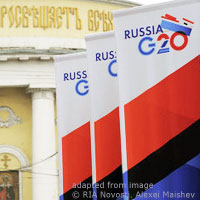Syria raised, but leaders mostly stick to economy at G20

(Moscow News – themoscownews.com – Nathan Gray – September 6, 2013) While Syria lurked in the background of the G20 leaders’ summit, which opened on Thursday, official discussions had their focus firmly on economic issues.
The conflict in Syria, however, did occasionally come to the foreground. President Vladimir Putin himself raised the topic at the end of his opening address, saying that he would not allot time during the initial meeting for discussion, but instead over the working dinner that followed.
Italian Prime Minister Enrico Letta confirmed the existence of a split among leaders over Syria in a tweet in the wee hours of Friday morning, RIA Novosti reported.
“Dinner just finished, during which a division in positions on Syria was confirmed,” Letta wrote in Italian.
Mostly about the money
The bulk of the official sessions, however, dealt with international economic policy in light of the ongoing crisis, the G20 coming in for praise during the summit for its efforts at mitigating the crisis’s effects.
Finance Minister Anton Siluanov, at a briefing Thursday evening, outlined the results of the summit’s first session, emphasizing that the leaders addressed the finance ministers’ agenda as developed at their own summit in Moscow in July.
The ministers’ action plan on stimulating growth and investment, and reducing unemployment and the volatility of capital flows, was approved by the leaders, Siluanov said, bringing implementation forward as the next step.
As the G20 has managed the crisis, projections for developed countries have turned positive, he said, marking a shift in the situation since the 2012 summit.
“If one year ago, at the meeting in Los Cabos, the talk was about negative projections, now we can say that advanced economies are giving positive results,” he said.
The worries now are over growth in developing countries, including the BRICS, especially as the United States has said that it will begin wrapping up quantitative easing. The policy has contributed to increased investment in developing economies, but after May’s announcement that the program would soon come to an end, investors began to withdraw.
Tackling the problems in emerging economies will form the next challenge, Siluanov said, but he cited U.S. President Barack Obama as insisting that the conclusion of quantitative easing would be “gradual” and “rational.”
The road ahead
Further tasks for the G20 will focus on implementation of the OECD plan on tax avoidance and profit shifting, introduced at the finance ministers’ summit in July, the restriction of “shadow banking,” and financial regulation and the adoption of Basel III capital requirements starting in 2014.
Proposals for regulation include increased surveillance of large banks and insurance companies, and monitoring of shareholders’ fulfillment of their obligations.
“Additional requirements will be presented to these banks in terms of oversight, additional, heightened requirements for the obligations of shareholders in order that they bring shareholders responsibility for the future of these large organizations in the first place, and additional requirements in terms of official oversight,” Siluanov said.
Protectionism
Another important question was the risk of countries adopting protectionist measures in a climate of economic crisis.
The Russian sherpa to the G20, Ksenia Yudayeva, said Friday morning that agreement had been reached to extend an anti-protectionism policy, first instituted in 2008, to 2016, Prime News Agency reported.
“There were fairly stormy discussions yesterday on the working level about the problem of protectionism,” Yudayeva said. “We very much count on the leaders’ support, because we more or less succeeded in agreeing on a rejection of protectionism through 2016.”
The policy was first instituted in 2008, and has been extended at every subsequent leaders’ summit, she said.
It is not observed 100 percent, she acknowledged, as some countries do adopt protectionist measures, but that the policy itself is a principle limiting negative effects on international trade.
